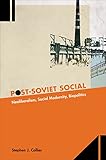Post-Soviet Social : Neoliberalism, Social Modernity, Biopolitics / Stephen J Collier.
Material type: TextPublisher: Princeton, NJ : Princeton University Press, [2011]Copyright date: ©2011Edition: Course BookDescription: 1 online resource (312 p.) : 2 halftones. 5 line illusContent type:
TextPublisher: Princeton, NJ : Princeton University Press, [2011]Copyright date: ©2011Edition: Course BookDescription: 1 online resource (312 p.) : 2 halftones. 5 line illusContent type: - 9780691148311
- 9781400840427
- Biopolitics -- Russia (Federation)
- Neoliberalism -- Russia (Federation)
- Post-communism -- Economic aspects -- Russia (Federation)
- SOCIAL SCIENCE / Anthropology / General
- Belaya Kalitva
- Petrine absolutism
- Rodniki
- Russian absolutist state
- Soviet Union
- Soviet cities
- Soviet city-building
- Soviet planning
- Soviet social modernity
- Soviet social
- Washington Consensus
- Window of Opportunity
- architectural avant-garde
- budgetary austerity
- budgetary reform
- budgets
- bureaucratic structures
- centralized heating systems
- city plan
- city-building
- collectivity
- communal services reform
- formal rationalization
- government budget
- industrial production
- industrialization
- infrastructural social modernity
- infrastructure crisis
- infrastructures
- khoziaistvo
- labor
- liberalization
- market economy
- material structure
- neoliberal reform
- neoliberal reforms
- neoliberalism
- political projects
- political rationality
- privatization
- production
- redistribution
- resource flow
- settlement
- social government
- social modernity
- social welfare
- socialism
- sociality
- spatial development
- spatial layout
- stabilization
- structural adjustment
- substantive provisioning
- urban development
- urban modernity
- urban populations
- urban utilities
- urbanist discussions
- 330.947 23
- HC340.12 .C647 2017
- online - DeGruyter
- Issued also in print.
| Item type | Current library | Call number | URL | Status | Notes | Barcode | |
|---|---|---|---|---|---|---|---|
 eBook
eBook
|
Biblioteca "Angelicum" Pont. Univ. S.Tommaso d'Aquino Nuvola online | online - DeGruyter (Browse shelf(Opens below)) | Online access | Not for loan (Accesso limitato) | Accesso per gli utenti autorizzati / Access for authorized users | (dgr)9781400840427 |
Frontmatter -- Contents -- Illustrations and Tables -- Preface: Formal and Substantive -- Acknowledgments -- CHAPTER ONE. Introduction: Post-Soviet, Post-Social? -- PART ONE. Soviet Social Modernity -- Introduction -- CHAPTER TWO. The Birth of Soviet Biopolitics -- CHAPTER THREE. City-building -- CHAPTER FOUR. City-building in Belaya Kalitva -- CHAPTER FIVE. Consolidation, Stagnation, Breakup -- PART II. Neoliberalism and Social Modernity -- Introduction -- CHAPTER SIX. Adjustment Problems -- CHAPTER SEVEN. Budgets and Biopolitics -- CHAPTER EIGHT. The Intransigence of Things -- EPILOGUE: An Ineffective Controversy -- Notes -- References -- Index
restricted access online access with authorization star
http://purl.org/coar/access_right/c_16ec
The Soviet Union created a unique form of urban modernity, developing institutions of social provisioning for hundreds of millions of people in small and medium-sized industrial cities spread across a vast territory. After the collapse of socialism these institutions were profoundly shaken--casualties, in the eyes of many observers, of market-oriented reforms associated with neoliberalism and the Washington Consensus. In Post-Soviet Social, Stephen Collier examines reform in Russia beyond the Washington Consensus. He turns attention from the noisy battles over stabilization and privatization during the 1990s to subsequent reforms that grapple with the mundane details of pipes, wires, bureaucratic routines, and budgetary formulas that made up the Soviet social state. Drawing on Michel Foucault's lectures from the late 1970s, Post-Soviet Social uses the Russian case to examine neoliberalism as a central form of political rationality in contemporary societies. The book's basic finding--that neoliberal reforms provide a justification for redistribution and social welfare, and may work to preserve the norms and forms of social modernity--lays the groundwork for a critical revision of conventional understandings of these topics.
Issued also in print.
Mode of access: Internet via World Wide Web.
In English.
Description based on online resource; title from PDF title page (publisher's Web site, viewed 29. Jul 2021)


